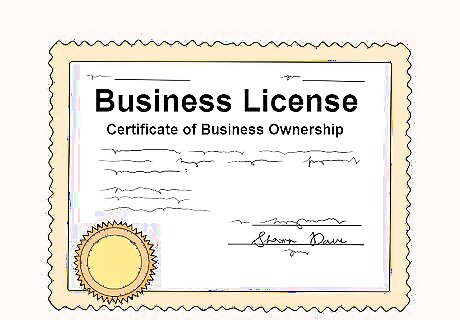
views
X
Trustworthy Source
U.S. Small Business Administration
U.S. government agency focused on supporting small businesses
Go to source
[2]
X
Research source
[3]
X
Trustworthy Source
U.S. Small Business Administration
U.S. government agency focused on supporting small businesses
Go to source
Identifying Your Insurance Needs

Determine what business risks you face. Insurance protects you from risk, but as a producer of cosmetics your risks may vary depending on where and how you produce your cosmetics and how you market and distribute them. You need general liability insurance if you have a storefront where you sell your cosmetics. This insurance protects your business if, for example, someone slips and falls in your store and sues you for negligence. Product liability insurance is the big one for a cosmetics line. This insurance protects you and your business in the event one of your customers is harmed by your products. In the context of cosmetics, this includes, for example, someone having an allergic reaction to one of your ingredients. Something like that can happen even if you're using all-natural ingredients. You may need premises liability insurance if you have employees helping you make your cosmetics. Professional liability insurance also may help you if you run a blog in conjunction with your cosmetic line through which you dispense beauty or makeup advice. If you think you need several types of insurance, you might consider buying a business owner's policy. These policies bundle several types of insurance commonly needed by small business owners together, which can lower your premium.

Speak to an insurance agent. If you're having trouble figuring out exactly what risks you need to protect your business against, an insurance agent can help you analyze your business and identify the types of insurance you need. You aren't obligated to buy any policies at this stage – you're trying to figure out what you need. Be skeptical of agents who seem to be more motivated to sell you something than to answer your questions. You might want to find an agent through your local small business association, or through a trade association. You also can look for further information and advice on the internet. The website of the federal government's Small Business Association (SBA) has lots of resources on business insurance.

Review licensing requirements in your state. If you want to manufacture and sell your own cosmetic line, you typically must get a business license in the state where your business will be based. Some states require certain minimum levels of insurance as a condition of maintaining a license in good standing. The SBA has a list of all state licensing requirements on its website. Just search for "state licenses and permits" to find the page. On the licensing page, click on the name of the state where you live to find what you need. Keep in mind that if you don't meet your state's licensing requirements, the regulatory agency can shut down your business, and you may end up paying substantial fines or penalties. The requirements of distributors or retail establishments where you plan to sell your cosmetics are just as important as your state's licensing requirements. Many distributors require product manufacturers to provide proof of a certain amount of product liability insurance coverage.

Calculate the amount and types of coverage you need. Experts in the cosmetics industry typically recommend that you have between $1 million and $2 million in product liability insurance. You also may want additional commercial liability or premises liability insurance. If you plan to make your cosmetics in your own home, check your homeowner's or renter's insurance. Many owners of home-based businesses believe this insurance also covers their business, but often business activities are explicitly exempted from coverage. If you're considering a business owner's policy, you still need to make sure you're covered for the appropriate levels under each type of insurance bundled in the policy. For example, it does you no good to have $5 million of general liability insurance if you only have $1 million in product liability coverage and the distributor you want to carry your cosmetic line requires you to have $2 million in product liability coverage.

Build in room for growth. You'll be purchasing coverage for at least a year, and you can't predict what will happen to your business during that time. For this reason, it's typically better for you to have too much coverage than to wind up having too little. Particularly with product liability insurance, you typically are required to pay your entire annual premium upfront. This can make it difficult to change your coverage in the middle of the year if you discover you need more to adequately accomplish your business's goals. If you know others in the industry, you may want to ask them for advice. For example, someone who has had a home-based cosmetic line for five years may be able to provide insight on things they wish they'd done when they were just starting out.
Shopping for Policies

Locate several providers. You typically can search online for insurance companies that offer commercial liability or product liability insurance. Focus on companies that provide insurance specifically for cosmetics manufacturers, as they will have a better understanding of the needs of your business. Doing a general internet search for "cosmetics product liability insurance" will get you some possibilities. You also want to ask anyone you know who is currently in the industry. If you don't know anyone personally, consider talking to someone in an industry or trade organization near you. Contact other people you see who have home-based cosmetic lines and ask them which insurance company they use. Small business owners frequently are more than willing to help others who express an interest in their fields. Many people who've established their own cosmetic lines also have blogs where they discuss various aspects of the industry. Look beyond cosmetics as well, to related industries such as homemade soaps or haircare products – these industries have many of the same insurance needs as cosmetics.

Complete insurance applications. Typically you must complete a basic application to get a quote for coverage. You will need to provide the insurance company with a little information about your business and the cosmetics you make. Insurance companies will vary in the amount of information they want about your business and your products before they can issue a quote. If you're looking for product liability insurance in particular, keep in mind that any quote you receive is only as accurate as the amount of information you give. Different ingredients have different risks associated with them. However, you typically are under no obligation to disclose every ingredient in your cosmetics. Some insurance companies won't cover certain ingredients at all due to the tremendous risk involved. This is a particular concern in the herbal supplements industry, but may impact you if you're including similar herbal ingredients in your cosmetics, such as kava or magnolia.

Discuss your quote with an agent. If you have any questions about the quotes or what is covered, you should be able to talk to an agent with the company. They can explain more about the quote and may be able to adjust it based on the information you provide. The most important thing you need to know about each quote is whether the insurance quoted will provide the coverage you need for your cosmetics line. Read any information that comes with the quote carefully, including disclaimers or disclosures. Keep in mind that your premium may increase after you complete the full application for insurance coverage, based on a number of factors including your business background and credit history.

Look for discounts. Industry associations and trade organizations may have arrangements or affiliations with particular insurance companies. Going through one of these organizations may save you a lot of money compared to getting a policy on your own. On the other hand, going through a business network or trade organization may limit your choices. There may only be specific policies available through a single insurance company. If you're not going to get the amount of coverage you need through a network plan, the money you'd save is irrelevant. If you already have insurance policies through an insurance company, it can't hurt to see if they offer the insurance you need for your cosmetic line. Many insurance companies provide discounts to customers who have more than one policy with them.

Compare rates and levels of coverage. Once you've gotten quotes from several insurance companies, take some time to compare what they're offering. You also want to look at other aspects of the company, such as location and customer service. Generally, you want to find the most coverage at the least cost to you. When assessing the cost, take into account your deductible in addition to the premium you must pay. Typically you'll pay a higher premium for the same amount of coverage with a lower deductible. Make sure the deductible is an amount you can afford to pay if something happens. An extremely low premium payment won't be of much benefit to you if you have to pay thousands of dollars you can't afford on a claim.
Getting Your Coverage

Meet with an agent or broker. Before you start your coverage, you should arrange to meet with an agent or broker who works for the insurance company that will be writing your policy. This agent or broker will be able to explain the policy to you and answer any questions you might have. Many insurance companies give you the opportunity to get a quote and purchase your policy online, rather than coming into an office in person. This can be a benefit to you because it gives you access to many different insurance carriers. However, it may make it more difficult to talk to someone if you have questions, or get personal attention to your policy. If you're buying a policy online, look for a customer service phone number or email so you can contact them with any questions. Get any explanations or promises from the agent or broker in writing, so you have proof of them if a problem comes up later.

Go over the policy you've chosen. Have the agent or broker explain all the terms and conditions of your policy, including the amounts of coverage and the types of incidents or risks that are covered by your policy. Depending on the coverage you've chosen, your policy could be 20 or 30 pages long. You probably don't feel you have time to read that, or that you wouldn't understand it even if you did read it. This is where talking to an agent or broker is important. These professionals have training and experience in breaking down the legalese of an insurance policy into language anyone can understand. If you don't understand your insurance policy, the coverage it offers, or what you should do if you need to file a claim – don't sign it.

Sign your policy acceptance. Typically you must sign a number of documents to purchase your policy. In most cases your policy is effective the date you sign these forms, although you may be allowed to choose a specific effective date. Make sure you have complete copies of your policy and all forms you've signed for your records. Keep your copies in a safe place, preferably in the same place where you keep your business licenses, permits, and other legal documents related to your cosmetic line.

Pay your premium. While a few insurance companies allow small business owners to pay commercial or product liability premiums in installments, typically you must pay the entire annual premium up front. Your agent or broker should let you know if an installment plan is available for your premium. Keep in mind that if you pay in installments, you may end up paying more total than you would if you paid your entire annual premium up front. The other thing to keep in mind with installments is that missing a single payment could result in cancellation of your policy, leaving you vulnerable. On the other hand, paying your entire annual premium up front means you don't have to worry about it for the rest of the year.


















Comments
0 comment